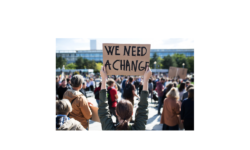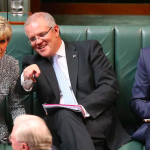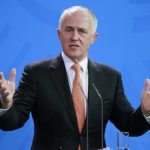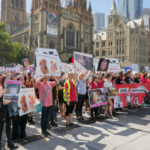Federal Government Moves to Silence Protest By Cracking Down on Charities

In an attempt to silence its civil society critics, the Morrison government is continuing the Coalition’s half-decade-long assault on charities and not-for-profits by attempting to make them liable for any involvement in protests that result in minor offences, or for even provoking such action.
Released on 16 February, the exposure draft of the Australian Charities and Not-For-Profits Commission Amendment (2021 Measures No. 2) Regulations 2021 contains a new law that if passed would result in charities being deregistered in relation to summary offences they’re responsible for.
Summary offences are minor offences. The proposed law targets these offences when they involve real property, personal property or persons. And the reason this targets protest is these types of summary offences are those that activists are most often charged with when demonstrating.
The Australian Charities and Not-For-Profits Commission Act 2012 (Cth) provides registered charities with tax concessions and other benefits that would be revoked if the new law was breached.
However, Morrison and Co haven’t stopped there, as they’re threatening deregistration on the more extreme grounds of provocation.
The proposed amendment to the regulations governing charities and not-for-profits inserts a further provision that makes the 59,000-odd registered entities in this country liable in cases where their resources or materials provoke others to commit summary, indictable or civil offences.
Thought crimes
“Charities, including religions, will buckle under new non-laws that create thought crimes,” said Civil Liberties Australia (CLA) CEO Bill Rowlings. “If someone you have no control over uses information on your website to maybe break a law – maybe not – you are guilty.”
“How’s that for the government creating a new wave of thought police?” he continued. “You can be found guilty, and lose charity registration rights and benefits, because of what someone else thought, or did – something you knew nothing about.”
Governance standard 3 of the Australian Charities and Not-For-Profits Regulations 2013 (Cth) already provides that charities can be held responsible for conduct they engage in that results in indictable offences or civil offences carrying at least 60 penalty units.
If both houses pass the amendment, it will extend this liability to real property, personal property and personal injury summary offences.
The amendment further adds provisions so that when third parties commit any of the above-mentioned offences and these actions are deemed to have been provoked by a charity’s or a not-for-profit’s resources, then this entity also holds responsibility and can be deregistered.
Charities’ and not-for-profits’ resources that can evidently lead to such offending include publications, websites, social media, mailing lists, employees and funds.
“Even for the federal government’s secret police and secret trial regime, as revealed by the closed courts and sentencing of Witnesses J and K,” Rowlings told Sydney Criminal Lawyers, “this is a giant leap further into the fires of authoritarianism.”
A sustained attack
The Turnbull government commenced the campaign to stifle civil society dissent with its Electoral Funding and Disclosure Reform Bill 2017, which sought to gag charities. However, a coordinated campaign resulted in an updated version being passed that didn’t impact charities in that way.
“Charities are the glue that keep Australian society together,” declared Rowlings. “The Coalition government is paint stripper on steroids, trying to break the bonds between the poorest, weakest people and those supporting them, volunteers and non-profit groups organised as charities.”
In something of a shock move, the federal Coalition also appointed Dr Gary Johns as commissioner of the Australian Charities and Not-For-Profits Commission (ACNC) in late 2017. This was a red flag because the former MP was known to be a vocal critic of the work that charities carry out.
“The government introduced an infection into Australia’s charity system, in the name of ACNC boss Gary Johns,” Rowlings added. “The ex-Labor MP converted to Liberal thought at the temple of the Institute of Public Affairs, which is the plaything of mining billionaires.”
The long-term civil liberties advocate further questions the process taken by the Morrison government in delivering the proposed laws, as they were created via the delegated legislation process, which permits the executive to draft regulations without input from the rest of parliament.
Silencing dissent
Some of the organisations that aren’t so obviously thought of as registered charities but do campaign on issues that can lead to protests are: Amnesty International, Greenpeace, 350.org, the First Nations Death in Custody Watch Committee and the Climate Council of Australia.
As then federal charities minister Zed Seselja was spruiking the proposed laws back in December, he suggested that “the government strongly supports the right to peaceful, lawful protest”, as it’s “one of our key democratic principles”.
And despite the amendment and its accompanying explanatory statement making no mention of targeting protest, the minister was quite plain in outlining that the coming laws were aiming to crackdown on “activist organisations masquerading as charities”.
Seselja then listed some of the actions that need curbing: “late night break-ins”, “illegal blockades”, “damage to property and theft of stock”. However, most of these crimes fall under the classification of indictable offences and, therefore, charities are already liable in that regard.
The authoritarian creep
“This government has not seen a rule of law it can’t shatter – or a morality it can’t squish – in the name of ideology,” Rowlings made clear. “It has stripped away personal choice, trashed rights and liberties and made life harder for those doing it tough.”
Other ideological forays the Morrison government has partaken in over recent years, include its attack on the higher education sector, as well as seeking to install religious freedoms laws that would undermine diversity in all forms, and it further has a growing tendency towards militarisation.
There’s also been an ongoing creep towards a surveillance state, with the Coalition having – with bipartisan approval – implemented a metadata regime, enacted laws to pry into people’s encrypted messaging and computers, as well as enhancing the powers of spying agencies.
“Australia desperately needs a human rights act, to lay down a benchmark for what is right and proper in our society,” Rowlings concluded. “Standards below which no government can sink.”
“We need that rights foundation to stop these silken-tongued extremists even proposing anti-freedoms and personal choice laws, like this charities restraint regulation would create.”







